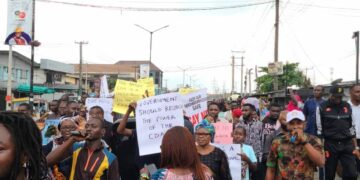The war in Gaza is increasingly leading to a clamp down on free speech in western nation, particularly in Europe where governments are equating calls for a cease fire and a free Palestine as anti-Semitism.
The war has also led debates on the right to peaceful protests, with the media and human rights organisation weighing-in on the repercussions on silencing critics of the war.
And in countries like France, Germany and Austria, pro-Palestinian protests are being banned by the police with some protesters arrested for waving Palestinian flags, or wearing the Keffiyeh.
In the United States of America, the clamp down is taking the form of censorship and has put the college campuses at the centre of the debate on free speech and what constitutes anti-semitism.
The Washington Post, a leading newspaper in the US in an editorial on Friday suggested universities should stop taking a stand on every conflict that breaks out. Many corporate executives have in recent weeks have threatened to withdraw funding for top universities over their inability to rein in students seen as antisemitic or taking pro-Palestinian postures.
Corporate organisations are also shaming and blacklisting some of the students for justifying the October 7 attack by Hamas that killed more than 1400 Israelis and led to the abduction of 242 others.
In the editorial, the Washington Post said, “Universities need to recommit to the principles in the University of Chicago’s Kalven report of 1967. Drafted during a similar period of conflict and upheaval, the report says: “The university is the home and sponsor of critics; it is not itself the critic. … It is not a club, it is not a trade association, it is not a lobby.” When a university takes a “collective position,” it says, this inhibits the “full freedom of dissent on which [the university] thrives.” After Oct. 7, Chicago adhered to the Kalven principles. Its president, Paul Alivisatos, did not speak out on the Hamas attacks or the broader Israeli-Palestinian conflict.
The paper continued, “for secular institutions committed to unfettered and contentious speech, silence is the best policy. Paradoxically, nonintervention by university leaders can empower students and faculty members to speak their minds and register dissent from the prevailing wisdom.
“When administrators take sides, they are sending a message to students and professors that there is a right way to think. The role of colleges and universities is not to tell students what to think, much less what the administration thinks. It is to teach students how to think.”
According to Tanya Greene, the US program director at Human Rights Watch, “The unprecedented carnage in Israel and Palestine is having repercussions in the United States, testing pillars of democracy including the fundamental human rights to free speech and assembly.
“Government officials, law enforcement, college and university administrators, and employers, among others, need to step up to uphold them. US officials should protect free speech and peaceful protest, regardless of viewpoint, consistent with international human rights standards.”
But clamp down has also played out in the US Congress where the only Palestinian- American lawmaker, Rashida Tlaib was censured by members of the House of Representatives on Novem per 7, 2023 for her criticism on the war being waged on Gaza.
In her defense, Tlaib said, “The idea that criticizing the government of Israel is antisemitic sets a very dangerous precedent. And it’s been used to silence diverse voices speaking up for human rights across our nation.”
In Berlin, the German capital, the clamp down has been particularly high-handed affecting even a children’s demonstration to mourn the Palestinian children killed by Israeli strikes in the past month.
According reports, permitted protests were banned from using slogans such as “stop the war” and “free Palestine.”





